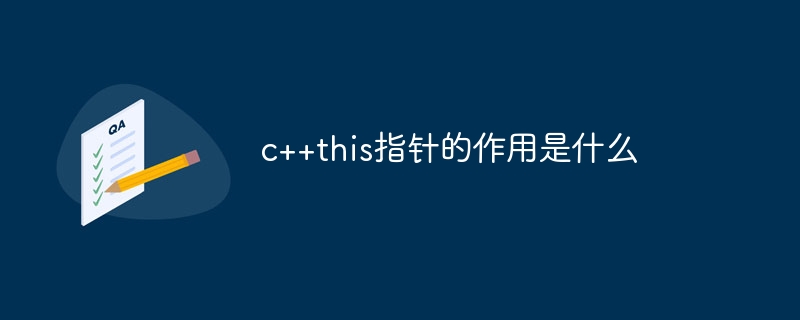Home >Common Problem >What is the function of c++this pointer
What is the function of c++this pointer
- 小老鼠Original
- 2023-09-20 14:04:192582browse
The functions of this pointer are: 1. Access the member variables and member functions of the current object in the member function. The member function can access the member variables of the object through the this pointer. When calling a member function of an object, The compiler automatically passes the address of the object to this pointer, so that the this pointer can be used to access the member variables of the object in the member function; 2. Call other member functions in the member function. When one member function calls another member function, the compiler The compiler will automatically pass the address of the current object to the this pointer of the called member function.

#This pointer is a special pointer in C that points to the address of the current object. In C, each object has its own memory space for storing the object's member variables and member functions. The function of this pointer is to access the member variables and member functions of the current object in the member function.
In C, member functions can access the object's member variables through this pointer. When calling a member function of an object, the compiler will automatically pass the address of the object to the this pointer, so that the this pointer can be used to access the object's member variables in the member function. For example, if there is a class defined as follows:
cpp
class MyClass {
int x;
public:
void setX(int value) {
this->x = value;
}
int getX() {
return this->x;
}
};
In this example, the setX function uses this pointer to access the object's member variable x and assigns the incoming value to x. The getX function also uses this pointer to return the value of the object's member variable x.
This pointer can also be used to call other member functions in member functions. When a member function calls another member function, the compiler automatically passes the address of the current object to the this pointer of the called member function. In this way, other member functions of the current object can be accessed through the this pointer in the called member function. For example, the above example can be modified as follows:
cpp
class MyClass {
int x;
public:
void setX(int value) {
this->x = value;
}
int getX() {
return this->x;
}
void printX() {
cout << "The value of x is: " << this->getX() << endl;
}
};
In the printX function, use the this pointer to call the getX function to get the value of x and print it out.
Another important role of this pointer is in the constructor and destructor of the class. The constructor is used to initialize the object's member variables, while the destructor is used to clean up the object's resources. In constructors and destructors, this pointer points to the object being created or destroyed. In this way, the this pointer can be used in the constructor and destructor to access the member variables and member functions of the object.
In general, the role of this pointer in C is to access member variables and member functions of the current object in member functions. It can be used to access the object's member variables, call the object's member functions, and access the object's members in the constructor and destructor. By using this pointer, you can more conveniently operate the members of the object and avoid naming conflicts between member variables and local variables.
The above is the detailed content of What is the function of c++this pointer. For more information, please follow other related articles on the PHP Chinese website!

